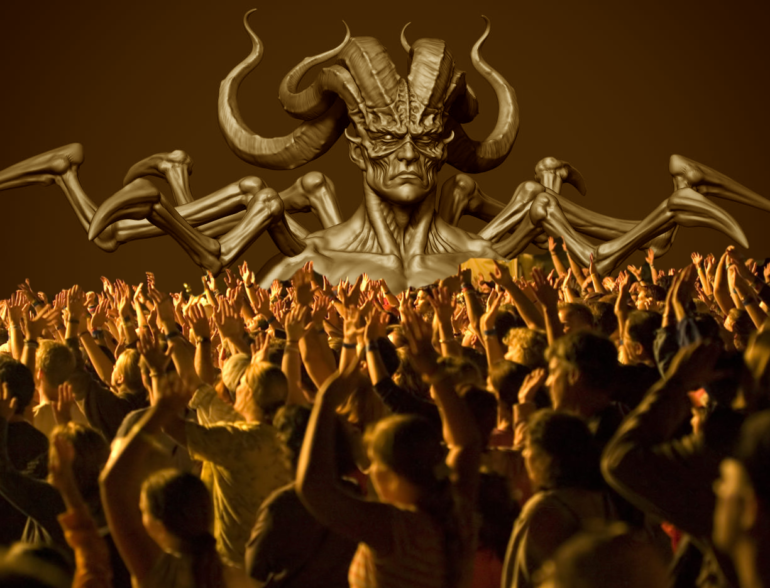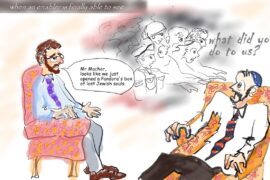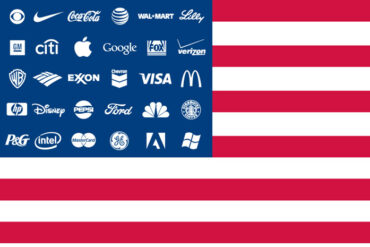What I’m going to state in this essay will perhaps shock many at first, but I want you to open up to the idea that our goals are the same: bringing justice to the harms caused by historic racism.
There are three religious elements that have emerged in the protest movement in 2020, in the massive upsurge in anti-racist activism and social change sparked by the video of the murder of George Floyd.
The Name of a (Negative) God
The first is like the name of a God – a negative god, one to be fought. When I was growing up in the 80s and 90s, we were told not to say the ‘N’ word. In general we were taught that – say it with me – “sticks and stones may break my bones, but names may never hurt me.” That was supposed to be the rule for all other forms of insult: kike, wop, mick, asshole, bitch, your momma is a whore, nerd, dork, dumbass, chink, gook, even gandhi (I don’t know why we couldn’t come up with a more insulting term for people from the Indian subcontinent).
It was part of a bigger educational and moral framework of being brought up as an American. There was a general principle, stated and unstated, and played out in practice: people are equal. Differences of ethnicity, religion, and color were all recognized to have ugly histories, but were implied to be primarily things of the past: today, now, as 7th or 10th graders in late 20th century America, we were now supposed to treat everyone with respect, fairly, equally. Which didn’t mean treating everyone with kid gloves; rather, everyone is fair game for insults, testing, challenging, hazing, too. The insults were meant to hurt at least a little: Italians, Irish, Greeks, Jews, Asians, Hispanics, Blacks, and even “white trash” [who were all, more or less, represented in my suburban hometown] were all expected to dish, and receive, trash-talking.
But one word was worse than all the others. It seemed reasonable, based on what we learned of even recent history, that n****r was off the table, that if you said it, it was a much bigger transgression than any other word. But that meant that it was like “Voldemort”: a magical incantation, a negative spell, an anti-god. If anyone said it out loud, it was basically a statement that the rules were suspended; if said to a Black person, it was considered acceptable for the Black person to punch them in the face. It’s basically the only word in the English language that has incantatory, instant power – that transforms the energy of everyone within earshot, and sometimes beyond.
The other insults all came to seem less and less powerful over time, to where they can all be used in jokes, quotes, friendly repartee; they’ve lost their sting. But the “n” word has only grown in power. I’m not sure that’s a desirable outcome. There’s something a little… patronizing about saying that everyone else should be able to handle being insulted, but Black people – what? can’t? It’s somehow more “powerful” than any other insult?
Making that word the one thing you couldn’t say ever, actually had the reverse effect: it made racism more powerful, made it into a sort of anti-God, it’s like a form of dark sorcery.
Systemic Racism: Everything, Everywhere
The second religious pattern I’ve noticed is the wide use of the concept of “systemic” racism. Rightfully, center stage is police brutality and the failure of American society to deliver on the promises of Civil Rights to include African-Americans in equal opportunity to achieve the American Dream, in soooo many ways. But what’s playing out in the cultural moment is something deeper and more emotional in reshaping our thoughts than even the ‘60s in many ways – more like a theological struggle. There are, absolutely, concrete points of data, recognizable and provable events and trends, of measurable injustice caused by racism. But not EVERYthing is racism; if everything is, then it ceases to become a meaningful category – it ceases to be something we can address. When it’s everything and everywhere – isn’t that like a God?
I submit that there’s something more like idol worship going on – and that however well intentioned, it’s something that a Jewish lens necessarily sees as problematic. If “systemic” racism is everywhere, pervades all of our interactions, it’s no longer subject to the logic of mere policies or concrete measures: it becomes theological, and only the priests know how to root it out everywhere. The Inquisition well understood that, as did the Soviet political commissars.
Giving racism that kind of power, saying it’s everywhere and everything, turns it into something more easily described by a much older term than anything from modern discourse: it’s an idol.
The first commandment is to have no other gods but the One; the second commandment is to not worship false idols.
Jews have always known this: one of the few things you can get every Jew to agree on, no matter how close to or far from our traditions, is that we don’t take Jesus as our lord and savior (I mean no disrespect to Christians, but for Jews, it’s non-negotiable).
Less than a century ago, Jews were the primary worldwide target of the most powerful white supremacists the world has ever seen, we were killed and also, enslaved (along with tens of millions of other untermenschen). So when well-meaning activists try to explain white supremacy to me, breathlessly showing me a pyramid with Nazis at the apex, well, you know, no offense, but I don’t think you need to explain Nazis and their supremacy to us Jews. It’s – what? Goysplaining? Trust me, we are well aware of the dangers of white supremacy. Really. I promise.
But let’s grant it all the benefit of the doubt: let’s say that surrendering to the certainties of this wokeness is entirely valid, and we will all see the light eventually. Let’s say it’s a religion, even. Let’s say it’s the actual word of God. Let’s say that anti-racism is actually the new revealed truth and Ibram Kendi and Ta-Nehisi Coates are the prophets, Robin D’Angelo and others the acolytes. Can we ask questions? Can we argue? Can we dispute points of morality and law? Because, let me tell you, Jews happen to know something about “having the Word of God” (or at least believing that we do!). It appears to even be the same word of God that almost all the people in the world – Christians and Muslims and those in countries dominated by those faiths, which is almost everyone – are quite familiar with.
And you know what, since receiving the alleged Word of God, what have Jews done?
Argue! Do we talk back to our prophets and rabbis, and even to God himself? Yes, Yes, and Yes! We debate everything from the smallest nuances up to the biggest life and death issues, and never, ever see ourselves in a position where we can’t still argue about it. The people of Israel challenged Moses on a hundred issues, even to give women more rights; Moses challenges God to not destroy His people in anger, and Abraham even challenged God when God revealed His plan to destroy Sodom; there’s never a moment when we can’t say “hey, can I ask a question?”
[Side note: I’m not sure why Christians and Muslims, when they got the Word of God too, didn’t get the memo that they are encouraged to question. If you’ve got a religion based on the word of [the initially Jewish conception of?] God, and you can’t question it, you’re doing it wrong.]
If, IF, anti-racism, is a religion, then shouldn’t we be able to question it, as is our good Jewish duty when even God Himself comes and gives us direct instructions? If the tenet of anti-racism is (as it far too often appears to be) “if-you-question, you’re-a-racist” – Well, it’s not a good religion.
Not that it should matter to a process of questioning, but I happen to believe in radical and even revolutionary change (and I even believe that is strongly grounded in Jewish values too). Defund, even abolish the police, and redistribute policing and power functions less adversarially; share wealth, redistribute it in a great global jubilee of equal inheritances; reparations for slavery, even – the Hebrews emphatically took the wealth of the Egyptians the night we fled, explicitly as reparations!
There should be space for me to support all those things, without being told What I Have To Believe and What I Have To Say. Do you still want your revolution if we won’t admit our “privilege”? Do you only want your revolution if you can examine what’s in all of our thoughts and hearts and we pledge allegiance to this dogma, do you dictate how we should be your “allies”?
The Guilt Trip
Jews have some experience with our oppressors suddenly declaring their terrible guilt, and apologizing, and then sort of acting like they super-love us. The Christian world’s about-face since 1945, and especially the evangelical Christians’ passionate love and support for Israel – um – being honest here, it mostly creeps us out. It’s weird; it feels like they’re projecting onto us – just instead of projecting something negative, they’re projecting something positive – but it’s still projecting! It’s still not a genuine conversation, a full relationship. It’s weird.
I can’t help but think there’s a parallel here. All this white guilt and “amplifying black voices” and – well – I have no doubt a lot of it is genuine (as with the Christian support of Israel) but isn’t it also, you know, weird? Kind of fetish-y? Projection-y?
Look, Jews also know a lot about saying to the world, “what was done to us was the worst crime of all of history, worse than anything else that’s happened to anyone.” Some Jews have wanted the world to feel guilty about it, not just Germans, but all Europeans, all the other nations of the world that closed their borders to us when we were refugees, including the United States.
But that guilt trip thing never worked all that well – arguably it’s partly backfired, especially in Europe – and at this point, we’d be content if people would stop trying to kill us for being Jews. People should remember the Holocaust, but the lessons of it are, primarily, universal: understand that this evil lurks in all men. Anti-Semitism was the driving force, but the act was the Holocaust. I don’t think that any Jews really believe that anti-Semitism can be excised from the hearts and minds and beliefs of humans; prejudices and conspiracy theories will always abound, God only knows why, and we’re basically OK with it as long as you don’t act on it. Don’t kill us (and if you try, well now since 1948 we know someone has our back, or you could say, we have our own and don’t need anyone’s help).
And that’s the third thing that has an element of religion in it: the guilt trip. Original sin is now racism – or is whiteness? The catechism, the declaration of faith, is “I have white privilege” or “I’m doing the hard work of being an ally” that’s become the equivalent of “I take Jesus as my Lord and Savior” or “There is no God but God, and Mohammed is his prophet.” And unfortunately, the last part of that is that if you disagree or refuse the first two, you may be subjected to something like the water trial of witches: if you deny it, you’re a racist, but if you agree that you’re a racist, you’re a racist!
In this Coronavirus moment in time, it’s also relevant to remember that the influenza epidemic of the 1920s set the stage for the purges and hysterias of the 1930s, that culminated in Stalin’s mass murders and the Holocaust. When death stalks the land, it’s perhaps a natural human impulse to seek to “purify” – and those “purity spirals” led to the fanatic hunts for witches, for enemies within and without, to scapegoating, and eventually to millions of people passionately perpetrating purges in the name of purity. Let’s not let those types of negative gods back into our world – especially into our actions.
Addressing Racist Actions
Racism is the set of beliefs that drove world-historical crimes; the African slave trade and the devastation and ongoing discrimination and exploitation of those communities were the actions. Actions can be addressed, but beliefs may take longer – or may not matter. Please consider that the model of fixing this set of injustices need not be changing the hearts and minds of all, which I believe (with some evidence) is impossible; wouldn’t it be enough to face and stop the crime – the external, visible, measurable crime?
If you’re involved in this movement (and almost all of us are, whether online or in workplace discussions or hiring decisions or voting, it touches all of us), please consider this. One need not agree with an entire dogma in order to help bring positive social change, even to bring revolution. And if the change being brought demands, insists, that you change your beliefs – well, that alone might be un-American, in the sense of Freedom of Religion. But if it goes further and inspects your beliefs, excommunicates you from your job or career or society unless you are pure, demands that you believe – it’s idol worship!
We’re Jews, and as Jews, we don’t do that. And to the extent that our creed, our moral framework, is still a respected piece of holding the morality of civilization together, it asks of the world very little: that you establish justice, and that you not worship idols. Bringing justice is absolutely critical, and it’s work worth doing. Idolatry can sneak in, like Voldemort, and re-channel and corrupt the immense energies of a revolution. It’s happened before. Don’t let it happen now.





